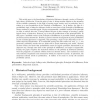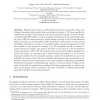344 search results - page 43 / 69 » Probabilistic Inductive Logic Programming |
121
click to vote
ICLP
1997
Springer
15 years 6 months ago
1997
Springer
We introduce novel, sound, complete, and locally optimal evaluation strategies for functional logic programming languages. Our strategies combine, in a non-trivial way, two landma...
138
click to vote
ILP
2007
Springer
15 years 8 months ago
2007
Springer
In this chapter, we describe a view of statistical learning in the inductive logic programming setting based on kernel methods. The relational representation of data and background...
116
click to vote
SYNTHESE
2008
15 years 2 months ago
2008
This article goes to the foundations of Statistical Inference through a review of Carnap's logic theory of induction. From this point of view, it brings another solution to t...
110
click to vote
TCS
2008
15 years 2 months ago
2008
Suppose we are given a set W of logical structures, or possible worlds, a set of logical formulas called possible data and a logical formula . We then consider the classification p...
128
click to vote
JAR
2002
15 years 1 months ago
2002
Abstract. Can theorem proving in mathematical logic be addressed by classical mathematical techniques like the calculus of variations? The answer is surprisingly in the affirmative...


